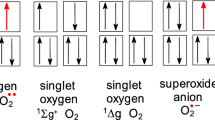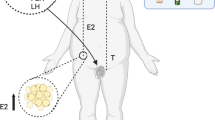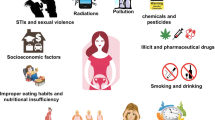Abstract
Prostate cancer is the most common human malignancy and the second leading cause of cancer deaths among men in Western nations. Descriptive epidemiologic data suggest that androgens and/or environmental exposures, such as diet (in particular, dietary fat), play an important role in prostatic carcinogenesis. One plausible link between diet and prostate cancer is oxidative stress. This process refers to the generation of reactive oxygen species, which can then trigger a host of pro-carcinogenic processes. Recent studies also indicate that androgens increase oxidative stress within human prostate cancer cell lines.
Recent data from our institution indicate that oxidative stress is higher within the benign epithelium of prostate cancer patients than men without the disease. This confirms our hypothesis and suggests that antioxidants such as lycopene, vitamin E, and selenium may play an important role in preventing disease progression. Large-scale clinical trials with some of these agents are currently in the design phase.
Similar content being viewed by others
References
Dhom G: Epidemiologic aspects of latent and clinically manifest carcinoma of the prostate. J Cancer Res Clin Oncol 106: 210-218, 1983
Parker SL, Tong T, Bolden BA, Wingo PA: Cancer Statistics, 1998. CA Cancer J Clin 46: 5-27, 1998
Fleshner N, Fair W: Impact of the environment of urologic cancers. AUA Update Series 15: 261-266, 1996
Fair W, Fleshner N, Heston W: Carcinoma of the prostate: A nutritional disease? Urology 50: 840-848, 1997
Haenzel W, Kurihara M: Studies of Japanese Migrants, 1 Mortality from cancer and other diseases among Japanese in the United States. JNCI 40: 43-68, 1968
Staszewski J, Haenzel W: Cancer mortality among the Polish born in the United States. JNCI 26: 1323-1337, 1961
Sakr WA, Haas GP, Cassin BF, et al.: The frequency of carcinoma and intraepithelial neoplasia of the prostate in young male patients. J Urol 150: 379-385, 1993
Pienta KJ, Esper PS: Rosk factors for prostate cancer. Ann Int Med 118: 793, 1993
Ames BN, Gold LS, Willet WC: Causes and prevention of cancer. Proc Natl Acad Sci 92: 5258-5265, 1995
Halliwell B: Free radicals, antioxidants and human disease: curiosity, cause or consequence? Lancet 344: 721-724 1994
Wynder EL: Cancer prevention: optimizing lifestyles with special reference to nutritional carcinogenesis. Monogr of Natl Cancer Inst 12: 87-91, 1992
Wasylyk C, Wasylyk B: Oncogene conversion of Ets affects redox regulation in vivoand in vitro. Nucleic Acid Res 21: 523-529, 1993
Toledano MB, Leonard WJ: Modulation of transcription factor NFkB binding activity by oxidation-reduction in vitro. Proc Natl Acad Sci 88: 4328-4332, 1991
Wei H: Activation of oncogenes and or inactivation of anti-oncogenes by reactive oxygen species. Med Hypotheses 39: 267-270, 1992
Hainaut P, Miller J: redox modulation of p53 conformation and sequence-specific DNA binding. Cancer Res 53: 4469-4473, 1993
Aprikian AG, Srakis AS, Fair WR, Zhang ZF, Fuks Z, Cordon-Cardo C: Immunohistochemical determination of p53 protein nuclear accumulation in prostatic adenocarcinoma. J Urol 151: 1276-1281, 1994
Navone NM, Troncoso P, Pisters L, Goodrow TL, Palmer JL, Nichols WW, Von Eschenbach AC: P53 accumulation and gene mutation in the progression of human prostate carcinoma. J Nat Cancer Inst 85: 1657-1661, 1993
Theodorescu D, Broder S, Boyd J, Mills S, Frierson H: p53, bcl-2 and retinoblastoma as long-term prognostic markers in localized carcinoma of the prostate. J Urol 158: 131-137, 1997
Vaca CE, Wilhelm J, Harms-Ringdahl M: Interaction of lipid peroxidation products with DNA. A Review Mutat Res 195: 137-149, 1988
Esterbauer H: Aldehydic products of lipid peroxidation. In: McBrien DCH, Slater TF (eds). Free Radicals, Lipid Peroxidation and Cancer. London: Academic Press 1982, pp 101-128
Mukai FH, Goldstein BD: Mutagenecity of malondialdehyde, a decomposition product of peroxidized polyunsaturated fatty acids. Science 191: 868-869, 1975
Rose DP, Boyer AP, Wynder EL: International comparisons of mortality rates for cancer of the breast, ovary, prostate and colon, and per capita food consumption. Cancer 58: 2363, 1986
Wynder EL, Fujita Y, Harris RE et al.: Comparative epidemiology of cancer between the United States and Japan. Cancer 67: 746, 1991
Wynder El, Taioli E, Fujita Y: Ecology of lung cancer risk factors in theUSand Japan with special reference to smoking and diet. Jap J Cancer Res 83: 418, 1992
Hargreaves MK, Baquet C, Gamshadzahi A: Diet, nutritional status and cancer risk in American Blacks. Nutr Cancer 12: 1-28, 1989
Rotkin ID: Studies in the epidemiology of prostatic cancer: Expanded sampling. Cancer Treat Rep 61: 173-180, 1977
Graham S, Haughey B, Marshall J et al.: Diet in the epidemiology of carcinoma of the prostate gland, JNCI 70: 687-692, 1983
Mishina T, Watanabe H, Araki H et al.: Epidemiological study of prostatic cancer by matched-pair analysis. Prostate 6: 423-436, 1985
Heshmat MY, Kaul L, Kovi J et al.: Nutrition and prostate cancer A case-control study. Prostate 6: 7-17, 1985
Kaul L, Heshmat MY, Kovi J et al.: The role of diet in prostate cancer Nutr Cancer 9: 123-128, 1987
Ross RK, Shimizu H, Pagananini-Hill A et al.: Case-control studies of prostate cancer in Blacks and Whites in Southern California. JNCI 78: 869-874, 1987
Ohno Y, Yoshida O, Oishi K et al.: Dietary (-carotene and cancer of the prostate: A case control study. Cancer Res 48: 1131-1136, 1988
Kolonel LN, Yoshizawa CN, Hankin JH: Diet and prostate cancer: A case-control study in Hawaii. Am J Epidemiol 127: 999-1012, 1988
Mettlin C, Selenskas S, Matarajan N et al.: Beta-carotene and animal fats and their relationship to prostate cancer risk: A case-control study. Cancer 64: 605-612, 1989
West DW, Slattery ML, Robison LM et al.: Adult dietary intake and prostate cancer risk in Utah: A case-control study with special emphasis on aggressive tumors. Cancer Causes and Control 2: 85-94, 1991
Fincham SM, Hill GB, Hanson J et al.: Epidemiology of prostatic cancer: A case-control study. Prostate 17: 189-206, 1990
Talamini R, Franceschi S, La Vecchia C et al.: Diet and prostate cancer: A case-control study in Northern Italy. Nutr Cancer 18: 277-286, 1992
Walker ARP, Walker BF, Tsotetsi NG et al.: Case-control study of prostate cancer in Black patients in Soweto, South Africa. Br J Cancer 65: 438-441, 1992
Howe GR, Whitemore A, Burch G et al: Prostate cancer in relation to diet, physical activity, and body size in blacks, whites and Asians in the United States and Canada. JNCI 87: 629, 1995
Enstrom JE: Assessing human epidemiologic data on diet as an etiologic factor in cancer development. Bull NY Acad Med 58: 313-322, 1982
Snowdon DA, Phillips RL, Choi W: Diet, obesity and risk of fatal prostate cancer. Am J Epidemiol 120: 244-250, 1984
Severson RK, Nomura AMY, Grove JS et al.: A prospective study of demographics, diet, and prostate cancer among men of Japanese ancestry in Hawaii. Cancer Res 49: 1857-1860, 1989
Hsing AW: Diet, tobacco use, and fatal prostate cancer: Results from the Lutheran Brotherhood cohort study. Cancer Res 50: 683–6840, 1990
Mills PK, Beeson WL, Phillips Rl et al.: Cohort study of diet lifestyle, and prostate cancer in Adventist men. Cancer 64: 598-604, 1989
Giovannucci EM, Rimm EB, Colditz GA et al.: A prospective study of dietary fat and risk of prostate cancer. JNCI 85: 1571-1579, 1993
Wang Y, Heston W, Corr J, Fair W: Decreased growth of established human prostate LNCaP tumors in nude mice fed a low-fat diet. JNCI 87: 1427-1431, 1995
. Coffey DS: Prostate Cancer: An overview of an increasing dilemma. Cancer 71: 880-885, 1993
Hamalainen E, Aldercreutz H, Pusak P et al.: Diet and serum sex hormones in healthy men. J Steroid biochem 20: 459-464, 1984
Ripple MO, Henry WF, Rago RP, Wilding G: Prooxidant-antioxidant shift induced by androgen treatment of human prostate carcinoma lines. JNCI 89: 40-48, 1997
Han X, Liehr JG, Bosland MC: Induction of a DNA adduct detectable by 32P postlabelling in the dorsolateral prostate of NBL/Cr rats treated with estradiol-17∼B and testosterone
Irvine RA, Yu MC, Ross RK, Coetzee GA: The CAG and GGC microsatellites of the androgen receptor gene are in linkage disequilibrium in men with prostate cancer. Cancer Res 55: 1937-1940, 1995
Giovannucci E, Stampfer MJ, Krithivas K et al.: The CAG repeat within the androgen receptor gene and its relationship to prostate cancer. PNAS USA 94: 3320-3323, 1997
Reichardt JKV, Makridakis N, Henderson BE et al.: Genetic variability of the human SRD5A2 gene: implications for prostate cancer risk. Cancer Research 55: 3973-3975, 1995
Devgan SA, Henderson BE, Yu MDC et al.: Genetic variation of hydroxysteroid dehydrogenase type II in 3 radical/ ethnic groups: implications for prostate cancer risk. Prostate 33: 9-12, 1997
Ross RK, Pike MC et al.: Androgen metabolism and prostate cancer. Cancer Research 58: 4497-4504, 1998
Das S: Vitamin E in the genesis and prevention of cancer. Acta Oncol 33: 615-623, 1994
El Attar TM, Lin HS: Vitamin E succinate potentiates the inhibitory effect of prostaglandins on oral squamous carcinoma cell proliferation. Prost Leuk Essent FA 52: 69, 1995
Schonberg S, Krokan HE: The inhibitory effects of conjugated dienoic derivatives of linoleic acid on the growth of human tumor cells lines is in part due to increased lipid peroxidation. Anticancer Res 15: 1241, 1995
Vasavi H, Thangaraju M and Sachdanandam P: Effects of alpha-tocopherol on lipid peroxidation and antioxidant system in fibrosarcoma bearing rats. Mol Cell Biochem 131: 125, 1994
Fleshner N, Fair W, Heston W: Vitamin E inhibits the highfat diet promoted growth of established human prostate LNCaP tumors in nude mice. J Urol 159, 13, 1998
Alpha Tocopherol, Beta Carotene Cancer Prevention Study Group: The effect of vitamin E and Beta Carotene on the incidence of lung cancers and other cancers in male smokers. NEJM 330: 1029, 1994
Heinonen OP, Albanes D, Virtamo J et al: Prostate cancer and supplementation with alpha-tocopherol and beta-carotene: incidence and mortality in a controlled trial. J Natl Cancer Inst 90: 440-446, 1998
Farrell PM, Bieri JG: Megavitamin E supplementation in man. Am J Clin Nutr 28: 1381-1386, 1975
EI-Bayoumy K: The role of selenium in cancer prevention. In: VT Devita, S Hellman and S Rosenberg (eds), Cancer Prevention. Philadelphia PA: J.B. Lippincott Company, 1991, pp 1-15
Hunter DJ, Morris JS, Stampfer MJ et al.: A prospective study of selenium status and breast cancer risk. JAMA 264: 1128-1131, 1990
Van den Brandt PA, Goldbohn RA, Bode P et al.: A prospective study on toenail selenium levels and risk of gastrointestinal cancer. J Natl Cancer Inst 85: 224-229, 1993
Van den Brandt PA, Goldbohn RA, Bode P et al.: A prospective study on selenium status and the risk of lung cancer. Cancer Res 53; 4860-4865, 1993
Helzlsouer KJ, Comstock GW, Morris JS et al.: Selenium, lycopene, a-tocopherol, b-carotene, retinol and subsequent bladder cancer. Cancer Res 49: 6144-6148, 1989
Willett WC, Polk BF, Morris JS et al.: Prediagnostic serum selenium and risk of cancer. Lancet 2: 130-134, 1983
Yoshizawa K, Willett WC, Morris SJ et al.: Study of prediagnostic selenium level in toenails and the risk of advanced prostate cancer. J Natl Cancer Inst 90: 1219-1224, 1998
Clark LC, Coombs DF, Turnbull BW et al: Effects of selenium supplementation for cancer prevention in patients with carcinoma of the skin. JAMA 267: 1957-1964, 1996
Levander OA: Scientific rationale for the 1989 recommended dietary allowance for selenium. Perspect Pract 91: 1572-1576, 1991
Stahl W, Nicolai S, Briviba K et al.: Biological activities of natural and synthetic carotenoids: induction of gap junctional communication and singlet oxygen quenching. Carcinogenesis 18: 89-92, 1997
Hsing AW, Comstock GW, Abbey H, Polk B: Serologic precursors of cancer: retinol, carotenoids and tocopherol and risk of prostate cancer. J Natl Cancer Inst 82: 941-946, 1990
Giovannucci E, Ascherio A, Rimm E et al.: Intake of carotenoids and retinol in relationship to risk of prostate cancer. J Natl Cancer Inst 87: 1767-1776, 1995
Author information
Authors and Affiliations
Rights and permissions
About this article
Cite this article
Fleshner, N.E., Klotz, L.H. Diet, Androgens, Oxidative Stress and Prostate Cancer Susceptibility. Cancer Metastasis Rev 17, 325–330 (1998). https://doi.org/10.1023/A:1006118628183
Issue Date:
DOI: https://doi.org/10.1023/A:1006118628183




